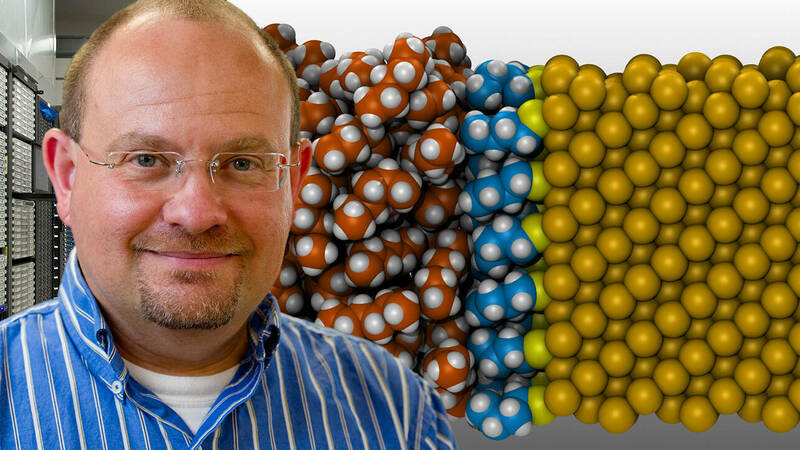
J. Daniel Gezelter
Professor; Senior Associate Dean for Education & Undergraduate Programs
- Office
- 215I Jordan Hall Of Science
Notre Dame, IN 46556 - Phone
- +1 574-631-7595
- gezelter@nd.edu
Research Areas
- Physical/Analytical Chemistry
Research Specialties
- Energy
- Theory
Prospective Graduate Students
Biography
| Year | Title |
|---|---|
| 2023-present | Senior Associate Dean for Education & Undergraduate Programs |
| 2020-2023 | Associate Dean for Undergraduate Studies |
| 2015-present | Professor, University of Notre Dame |
| 2005-2015 | Associate Professor, University of Notre Dame |
| 1999-2005 | Assistant Professor, University of Notre Dame |
| 1996-1999 | Postdoctoral Research Scientist, Department of Chemistry, Columbia University |
| 1995 | Ph.D. in Chemistry University of California, Berkeley |
| 1990 | CPS in Chemistry, University of Cambridge, Cambridge, UK |
| 1989 | B.S. in Chemistry & Philosophy, Duke University |
Selected Awards
2023 Provost's Award for Teaching Excellence in the Core Curriculum
2020 Shilts/Leonard Award for Outstanding Teaching in the College of Science
2013, 2020 Rev. Edmund P. Joyce Award for Excellence in Undergraduate Teaching
2002 National Science Foundation CAREER Award
1999 Camille and Henry Dreyfus New Faculty Award
1990-1993 National Science Foundation Graduate Research Fellowship
1989-1990 Churchill Scholar
Research Interests
Research in the Gezelter group involves theoretical and computational studies of the dynamics of complex, condensed-matter systems. Some areas of particular interest include: enantiomeric separation using fluid flow, dynamics at ice-water interfaces, and the mechanism of thermal transport. The group simulates ligand-capped metallic nanoparticles in liquid environments, ice-water interfaces, and metal surfaces that are partially oxidized.
The major goal is to arrive at simple models that can explain the unexpected and emergent behavior of these systems. A second, but equally important goal is to develop and test novel theoretical methods that will advance computer simulation as a tool for research in the chemical sciences.
Because we study complex systems, we rely on analytical tools from statistical mechanics as well as state-of-the-art computer simulations. A large component of the research in the group is the development of efficient algorithms to perform molecular dynamics simulations and to obtain useful information from them. We are particularly interested in new methods for computing electrostatic interactions and for performing non-equilibrium simulations.
Selected Publications
- Shavalier, S. and Gezelter, J. D. "Thermal Transport in Citrate-Capped Gold Nanostructures using a Polarizable Force Field" 2022, Journal of Physical Chemistry C 126 (30), pp 12742-12754. DOI: 10.1021/acs.jpcc.2c01333 , ChemRxiv: 10.26434/chemrxiv-2022-7xp7g
- Duraes, A. and Gezelter, J. D. "Separation of Enantiomers through Local Vorticity: A Screw Model Mechanism" 2021 Journal of Physical Chemistry B, 125 (42), pp.11709-11716. DOI: 10.1021/acs.jpcb.1c07127.
- Bhattarai, H.; Newman, K. E. and Gezelter, J. D. "The Role of Polarizability in the Interfacial Thermal Conductance at the Gold-Water Interface" 2020 Journal of Chemical Physics, 153 (20), 204703. DOI: 10.1063/5.0027847.
- Neidhart, S. M. and Gezelter, J. D. "Thermal Conductivity of Gold-Phenylethanethiol (Au144PET60) Nanoarrays: A Molecular Dynamics Study" 2020 Journal of Physical Chemistry C, 124 (5), pp.3389-3395. DOI: 10.1021/acs.jpcc.9b10895.
- Bhattarai, H.; Newman, K. E. and Gezelter, J. D. "Polarizable Potentials for Metals: The Density Readjusting Embedded Atom Method (DR-EAM)" 2019 Physical Review B, 99 (9), 094106. DOI: 10.1103/PhysRevB.99.094106.
- Louden, P. B. and Gezelter, J. D. "Why is Ice Slippery? Simulations of Shear Viscosity of the Quasi-Liquid Layer on Ice" 2018 Journal of Physical Chemistry Letters, 9 (13), pp.3686-3691. DOI: 10.1021/acs.jpclett.8b01339.
Software
The software we develop to carry out our research is available for free under a permissive Open Source license. We do this because some of the code may be useful to other researchers, and it is important allow skeptical inquiry into the methods we used to obtain results. The only way to do this is to provide the code and data.
Many links to scientific software (and discussions on a wide range of other topics) can be found at The OpenScience Project, which is also run by Dr. Gezelter.
OpenMD, an open source molecular dynamics engine, is our group's primary molecular dynamics code and is available with a permissive open source license.
OpenMD web pages: http://openmd.org
Git access: OpenMD
Jmol is a Java-based viewer for computational chemistry that was originally developed in Gezelter's lab. Jmol development is now in the hands of the Jmol development team, and is available under the GNU public license.
Jmol web pages: http://jmol.sf.net

